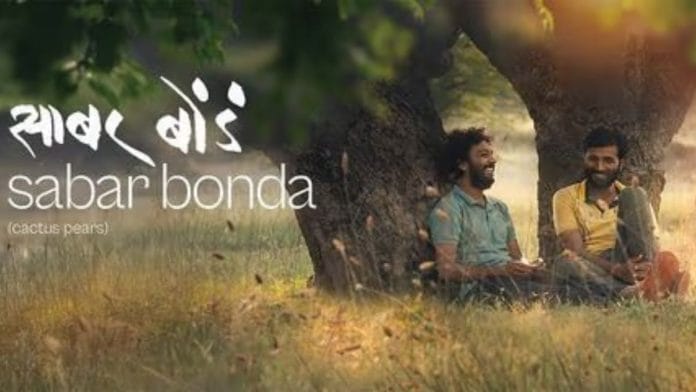New Delhi: Marathi filmmaker Rohan Kanawade offers an Indian perspective on queer love through Sabar Bonda.
It is also the first Marathi film to premiere at the Sundance Film Festival, and the only Indian film among the 87 selected from 33 countries for the February festival. The makers have now announced the film’s theatrical release in India on 19 September.
Sabar Bonda, titled Cactus Pears in English, is a testament to a queer man’s fragile hope. It was the result of Kanawade’s personal grief over his father’s passing in 2016. It connected his story to that of his protagonist, Anand. He began writing the film in 2020, but only started shooting three years later.
“The film captures the feeling of ‘falling in love’ during the grieving period. It’s a love story, and it shouldn’t be restricted to just being a queer story,” Kanawade tells ThePrint over Zoom.
The film follows a tender romance between two young men in a rural Maharashtrian village, Kharshinde. Anand, an educated, city-raised gay man, returns to his ancestral home to mourn his father’s death. There, he encounters Balya, a local farmer who has long kept his queerness hidden from the villagers. While grief leaves him vulnerable, it is Balya’s love that gives him the strength to face the homophobic environment—much like the ‘cactus pear’, which, despite growing in tough conditions, holds tender and nourishing flesh within.
Anand is met with persistent questions and pressures: When will he marry? And when will a daughter-in-law arrive to hold the family together?
“Even though my parents were aware of my queerness, the village wasn’t. So, I faced all sorts of marriage questions and pressure. Balya is the friend I wanted at that time, with whom I could escape,” Kanawade said, adding that only 10 per cent of the plot is autobiographical, while the remaining 90 per cent is fictional.
“The idea of ‘escape’ really stayed with me, and I felt it was something I could explore. It resonates deeply with queer people, but it’s just as relatable for straight men and women who are also trying to avoid the pressures of marriage,” he said.
Also read: ‘Why is your dad wearing a sari?’ South Indian films handle queer with care, unlike Bollywood
Positive parent-child equation
Sabar Bonda also stands apart from all the queer stories that have been made because it doesn’t restrict the film’s plot to the sexuality of its protagonists or their acceptance at home. It’s a love story.
“I wanted to tell a queer story that is rooted in our society and culture, where coming out to parents isn’t always a sad or traumatic memory,” said Kanawade, reflecting on his own journey.
He shared how his parents, his father, a chauffeur, and his mother, who never had formal education, accepted his identity in the blink of an eye. Kanawade highlighted that acceptance of queerness has no relation to education levels.
“My dad never finished school. My mum…an illiterate woman who grew up in a small village and came to the city only after marriage. They could accept me. Why do we complicate things when it’s so simple?” the filmmaker asked.
Kanawade also pointed out that the narrative of people in villages being unaware of or disconnected from queer identities is often inaccurate.
“I spoke with many individuals from rural areas who came out to their parents, farmers, in most cases, and were met with acceptance. The problem is that we don’t hear such stories,” he said.
This inspired Kanawade to depict a more positive and affirming parent-child relationship around sexuality on screen.
The filmmaker also observed that farmers weren’t getting married to the women in the village. The women were more educated, and they preferred an educated partner who lived in the city.
“Women rejecting farmers, like Balya, worked in his favour because he could not come out publicly,” Kanawade said.
Theatre release was ‘dream-like’
Back in 2019, Kanawade made a 22-minute Marathi short film U Ushacha, which centred around a rural lesbian love story between a single mother-farm labourer and a teacher at the local school. Despite being a short film, U Ushacha was released in theatres.
To get a theatrical release for another LGBTQ+ film was “dream-like” for Kanawade. Sabar Bonda is distributed by Rana Daggubati’s Spirit Media.
“We reached out to many distributors, but everyone turned it down. Rana sir’s team saw the film before Sundance and were instantly on board,” he said.
The filmmaker said that for Daggubati, the highlight was the mother-son equation.
“When we met for the first time, my mother was with me,” recalled Rohan Kanawade. “He kept repeating how much he loved the ‘mother’ character in the film, saying over and over that she was the best mother he had ever seen on screen.”
(Edited by Theres Sudeep)






